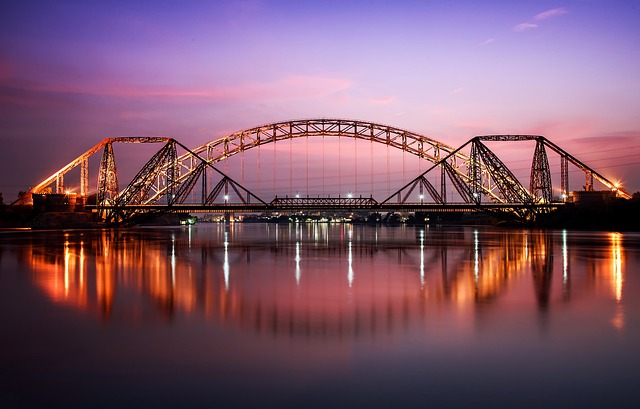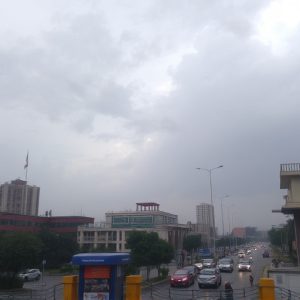5 Critical Insights on Karachi’s Monsoon Rain Forecast & Impact
Karachi experiences a distinct monsoon season from late June to mid-September, with increasing inten…….

Karachi experiences a distinct monsoon season from late June to mid-September, with increasing intensity and frequency of rainfall due to climate change. This variability leads to moderate to severe rainfall that can cause flooding. Recent forecasts predict higher chances of precipitation in the next week, with showers expected to alleviate water scarcity and provide relief from a heatwave. However, this also poses risks for low-lying areas and waterways where flooding is a concern. The city's infrastructure, particularly its drainage system, has been revealed as vulnerable following recent heavy rains, prompting immediate action to clear blockages, reinforce structures, and improve waste management to prevent exacerbation of flooding during the monsoon. Authorities and residents are working together to prepare for and mitigate the impacts of the upcoming rains through community clean-ups, stockpiling essentials, and enhancing disaster preparedness measures, underscoring the importance of proactive urban planning and infrastructure maintenance in ensuring the city's resilience.
As Karachi braces for the monsoon season, understanding its rain patterns becomes imperative. Our latest report delves into the nuances of Karachi’s weather forecasts, offering a detailed analysis of expected rainfall over the next week. We explore how recent downpours have influenced the city’s infrastructure and discuss the proactive measures being taken by the community to mitigate potential hazards. With a focus on public safety, we outline the advisories and alerts that residents should be aware of. Stay informed with our comprehensive update on the rain scenario in Karachi today.
- Karachi's Monsoon Patterns: What to Expect
- Rainfall Predictions for the Next Week in Karachi
- Impact of Recent Rains on City Infrastructure
- Precautionary Measures and Community Responses
Karachi's Monsoon Patterns: What to Expect

Karachi, situated on the Arabian Sea coast in Pakistan, experiences a distinct monsoon pattern influenced by the southwest monsoon winds that typically commence around late June and persist until mid-September. Residents can expect a period of dry weather prior to the onset of these rains, which are often accompanied by high humidity levels. The city’s annual rainfall is highly variable; some years witness a moderate amount, while others experience significant downpours that can lead to flooding in low-lying areas.
The monsoon season in Karachi is characterized by heavy and prolonged rainfall events, which have been observed to increase in intensity and frequency over recent decades due to climate change. These rains are crucial for replenishing the city’s water resources, yet they also pose challenges, such as infrastructure stress from the volume of water and potential urban flooding. It is important for local authorities and residents alike to stay informed about weather forecasts and to implement measures that mitigate the impacts of these intense monsoon events, ensuring the safety and well-being of Karachi’s diverse population throughout the rainy season.
Rainfall Predictions for the Next Week in Karachi

The meteorological department has released updated rainfall predictions for Karachi over the next week, indicating a higher likelihood of precipitation than previously forecasted. Residents can expect intermittent showers, with the potential for more substantial rainfall on at least two days within this period. These predictions are based on the current weather patterns and the behavior of the monsoon system over the Arabian Sea. The anticipated rain could significantly alleviate the city’s ongoing water shortage issues by replenishing reservoirs and groundwater levels. Additionally, the expected rainfall will likely bring much-needed relief from the sweltering heatwave that has been affecting the region. It is advisable for citizens to stay updated on real-time weather updates, as sudden changes in weather conditions can occur. Those living in low-lying areas or near water bodies should remain particularly vigilant and take necessary precautions against potential flooding. Preparation and caution are key as Karachi gears up for the predicted rainfall, ensuring the safety and well-being of its inhabitants.
Impact of Recent Rains on City Infrastructure

Recent torrential rains have had a significant impact on Karachi’s city infrastructure, highlighting both the resilience and vulnerability of the urban landscape. The metropolitan’s drainage system, already under strain from rapid urbanization, was tested to its limits. Overflowing stormwater drains led to flooding in several low-lying areas, causing disruptions to daily life and prompting the assessment of drain maintenance schedules. Roads, which are critical for transportation and commerce, were damaged due to waterlogging and landslides, necessitating immediate repairs. The rains also exposed issues with waste management, as accumulated garbage impeded the flow of water in drainage channels. In response, city authorities have initiated emergency measures to address these infrastructure challenges, including the clearing of clogged drains and the reinforcement of vulnerable structures. This event serves as a stark reminder of the need for proactive investment in infrastructure upgrades to mitigate the effects of extreme weather events and ensure the safety and continuity of life in Karachi’s diverse communities.
Precautionary Measures and Community Responses

As the monsoon season approaches, Karachi’s residents are bracing themselves for the annual deluge that can bring both relief from the sweltering heat and significant challenges. Authorities have issued a series of precautionary measures to mitigate potential disruptions caused by heavy rains. These include clearing drainage systems of blockages, reinforcing embankments prone to breaches, and ensuring emergency services are fully operational with adequate resources. The city’s municipal bodies have intensified efforts to manage waste effectively, recognizing that uncollected refuse can exacerbate flooding issues. In response, local communities have also taken proactive steps; residents are encouraged to clean their neighborhoods, maintain rainwater harvesting systems, and store essential items in anticipation of heavy rains. Community-led initiatives have emerged, such as organizing sandbag distribution, conducting awareness campaigns on disaster preparedness, and setting up local volunteer networks to support each other during adverse weather events. These collective efforts underscore the importance of community involvement and collaboration with local authorities to enhance the resilience of Karachi’s infrastructure and its people against the challenges posed by the rainy season.
As we conclude our discussion on Karachi’s rain patterns, it is evident that staying informed about rainfall predictions and the impact on city infrastructure is crucial for the community. The updates presented today highlight the importance of preparedness and the effectiveness of precautionary measures in mitigating the challenges posed by monsoon rains. Residents are encouraged to remain vigilant and support ongoing efforts to enhance Karachi’s resilience against weather-related disruptions. With a keen eye on the skies and a proactive approach, together we can ensure the safety and well-being of all who call this vibrant city home.


